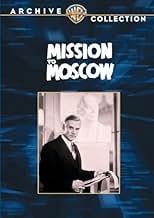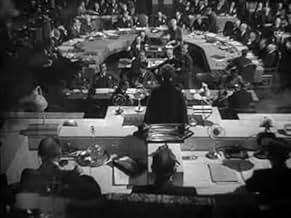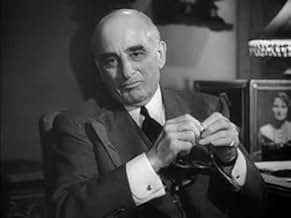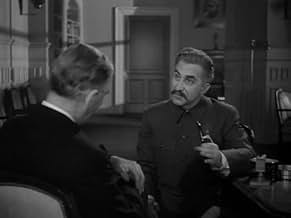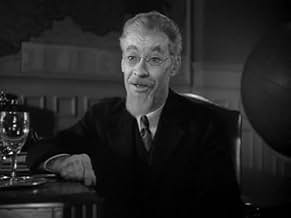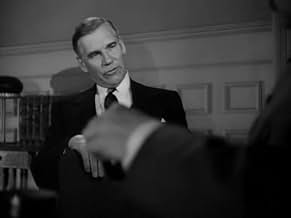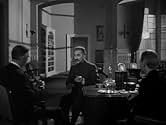IMDb RATING
5.4/10
1.1K
YOUR RATING
Ambassador Joseph Davies is sent by FDR to Russia to learn about the Soviet system and returns to America as an advocate of Stalinism.Ambassador Joseph Davies is sent by FDR to Russia to learn about the Soviet system and returns to America as an advocate of Stalinism.Ambassador Joseph Davies is sent by FDR to Russia to learn about the Soviet system and returns to America as an advocate of Stalinism.
- Nominated for 1 Oscar
- 2 wins & 1 nomination total
- Director
- Writers
- All cast & crew
- Production, box office & more at IMDbPro
Featured reviews
Self-professed "capitalist" and businessman Joseph Davies is sent to Moscow by President FDR just prior to the outbreak of hostilities in Europe in 1939. His mission; assess the war-readiness of the Soviet people and the reliability of the Stalin regime as a potential ally.
What follows could be described as a "guided tour" of Soviet Russia, courtesy of the Kremlin. Davies embarks on a whirlwind inspection of Soviet farms, factories, schools and cities, all abuzz with the task of transforming a semi-feudal nation of serfs and peasants into a mighty world power. It is - as its critics claim - a heavy-handed glorification of the Soviet "workers" state under Stalin. At the same time, it is an early confirmation of what most recent historians have acknowledged; the Stalin regime, for all its flaws, was a popular regime with the Russian people with astounding achievements to its credit. Viewers, at any rate, can make up their own minds (a useful recent survey is *Stalinism as a Way of Life* - Yale U Press, 2000).
Walter Huston is effective as the droll, efficient Davies. Watch, too, for a plethora of uncredited "B" actors on screen for just a few seconds. Glenn Strange, Tom Tully and Kathleen Lockhart are familiar faces to fans of the thirties and forties and serve to jar us back to reality at critical points. The film is a useful antidote to the overwhelming and omnipotent anti-Sovietism of the Cold War, and should be taken as such.
What follows could be described as a "guided tour" of Soviet Russia, courtesy of the Kremlin. Davies embarks on a whirlwind inspection of Soviet farms, factories, schools and cities, all abuzz with the task of transforming a semi-feudal nation of serfs and peasants into a mighty world power. It is - as its critics claim - a heavy-handed glorification of the Soviet "workers" state under Stalin. At the same time, it is an early confirmation of what most recent historians have acknowledged; the Stalin regime, for all its flaws, was a popular regime with the Russian people with astounding achievements to its credit. Viewers, at any rate, can make up their own minds (a useful recent survey is *Stalinism as a Way of Life* - Yale U Press, 2000).
Walter Huston is effective as the droll, efficient Davies. Watch, too, for a plethora of uncredited "B" actors on screen for just a few seconds. Glenn Strange, Tom Tully and Kathleen Lockhart are familiar faces to fans of the thirties and forties and serve to jar us back to reality at critical points. The film is a useful antidote to the overwhelming and omnipotent anti-Sovietism of the Cold War, and should be taken as such.
Is that why he put forward this saccharine view of the Soviet Union? It was done sincerely and naively, was it?
I remember this -- the 1943 film version of Ambassador Davies' book -- as quite dull, in spite of its obvious historical and political interest, from when I last saw it a number of years ago. In the notes I took down at the time, I have the film labelled as "disturbing propaganda" and cite two choice quotations:
"At least, one European nation with no aggressive intentions is ready for whatever comes", exclaims Ambassador Davies (as portrayed by Walter Huston).
According to a Soviet minister, "The army is strengthened by the purge of its traitors."
(Stalin almost succeeded in strengthening his army right out of existence.)
Amazon lists a couple of scholarly titles specific to the Ambassador Davies controversy. Perhaps this film will whet your appetite for a little more background.
I remember this -- the 1943 film version of Ambassador Davies' book -- as quite dull, in spite of its obvious historical and political interest, from when I last saw it a number of years ago. In the notes I took down at the time, I have the film labelled as "disturbing propaganda" and cite two choice quotations:
"At least, one European nation with no aggressive intentions is ready for whatever comes", exclaims Ambassador Davies (as portrayed by Walter Huston).
According to a Soviet minister, "The army is strengthened by the purge of its traitors."
(Stalin almost succeeded in strengthening his army right out of existence.)
Amazon lists a couple of scholarly titles specific to the Ambassador Davies controversy. Perhaps this film will whet your appetite for a little more background.
This film was made to patronize Joeseph Stalin and warm USA audiences to American-Soviet relations. Warner boss Jack Warner called it the worst mistake of his career. Warner was a supporter of FDR and Roosevelt asked him to have this film made based on the 1941 book by former Ambassador to the USSR (1936-1938) Joseph E. Davies. Several films were made during this time to achieve the same effect like song of Russia, North Star and Counter Attack but this was a film for Stalin to see himself, hand delivered on a yet another mission to Moscow by Davies. This film portrays the brutal dictator Stalin as a fair and just man who has turned his backward country into a progressive industrial and agricultural giant that is moving toward democracy and desires peace and protection of it's borders. It mentions nothing of the one million deaths in the Soviet gulags that happened during Davies' ambassadorial tenure on his mission to Moscow. It glosses over the infamous purge show trials where Stalin rid himself of prominent party leaders where he had 50 of the 54 of the three trials executed under the guise of traitors who were conspiring with Germany and Japan to weaken the USSR. Stalin wanted absolute power but this film portrays these as fair and just trials. The costly Russo-Finnish War of 1939 is described by Davies as simply the Soviets wanting to annex Finland to protect Finland from the Nazi's. 23,000 Finns were killed and 43,000 wounded in this so-called effort to protect them. 127,000 Soviets were killed and 265,000 wounded. There is no mention of Stalin's man-made famine of the 1930's that resulted in the genocide of millions of Ukrainians. Stalin is portrayed as everybody's favorite uncle and FDR wanted Stalin to see how sympathetic we were to to him by having him actually view this film to maneuver a FDR-Stalin meeting in Alaska. FDR sent former Ambassador Davies on another mission to Moscow with this film and a message to Stalin from Roosevelt as to how much he respected him. Davies' successor in Moscow Ambassador William H. Standley was not in the loop on this mission and furious and resigned. Davies screened this film for Stalin. Stalin wasn't that impressed with the film or FDR's intentions and stalled on the Alaska summit. FDR was forced to send Secretary of State Cordell Hull to Moscow and Stalin agreed to a summit in Teheran instead of Alaska which would also include Winston Churchill who FDR didn't want for his proposed Alaska summit.
Michael Curtiz is the director and the film looks good from an artistic standpoint. Curtiz was best known for Casablanca and after starting out as an important European director in the teens and twenties he moved to Hollywood and became an important filmmaker. Howard Koch who wrote screenplays for such films as Casablanca adapted the Davies' book for the screen which later got him blacklisted from Hollywood. Bert Glendon who did such films as Hotel Imperial and The Ten Commandments in the 20's, Kidnapped and Young Mr. Linclon in the 30's and One Night in Lisbon and Our Town in the 40's is the film's cinematographer. This film was nominated for an Academy Award for Best Art Direction and stars FDR's favorite actor Walter Huston as Ambassador Davies. Also in the talented cast are Ann Harding, George Tobias, Oscar Homolka, Eleanor Parker, Gene Lockhart, Frank Faylen and Cyd Charisse. You can enjoy the documentary style approach to this film and the skills of it's renowned filmmakers and big studio production but you can't get past a propaganda film that glorifies the Stalin dictatorship. I would give it a 4.5 out of 10.
Michael Curtiz is the director and the film looks good from an artistic standpoint. Curtiz was best known for Casablanca and after starting out as an important European director in the teens and twenties he moved to Hollywood and became an important filmmaker. Howard Koch who wrote screenplays for such films as Casablanca adapted the Davies' book for the screen which later got him blacklisted from Hollywood. Bert Glendon who did such films as Hotel Imperial and The Ten Commandments in the 20's, Kidnapped and Young Mr. Linclon in the 30's and One Night in Lisbon and Our Town in the 40's is the film's cinematographer. This film was nominated for an Academy Award for Best Art Direction and stars FDR's favorite actor Walter Huston as Ambassador Davies. Also in the talented cast are Ann Harding, George Tobias, Oscar Homolka, Eleanor Parker, Gene Lockhart, Frank Faylen and Cyd Charisse. You can enjoy the documentary style approach to this film and the skills of it's renowned filmmakers and big studio production but you can't get past a propaganda film that glorifies the Stalin dictatorship. I would give it a 4.5 out of 10.
This is one of the most astonishing films I've ever seen, not because of the content, but because of what it reveals about its subject. That would be one Joseph E. Davies, chosen by President Franklin Roosevelt before World War II as one of his personal ambassadors to the Soviet Union. FDR believed in the personal touch when dealing with other countries, so he would send his untrained cronies overseas for little fact-finding missions. Wendell Wilkie, for instance, went on one such mission at the height of the war. This film shows how well this tactic worked out.
This film records Davies' grand tour of Europe in the crucial 1937-1939 period. It opens with the real Davies giving a heartfelt (and very long) speech in which he describes himself as God-fearing and so forth (i.e., not a Communist). Then we segue to the actor playing Davies, Walter Huston, and follow his increasingly odd journey in which he talks to all the movers and shakers in Europe at the time (with the notable exception of Hitler, who refused to see him because he was "so busy," presumably planning his next invasion).
Now, this film was intended as a pure documentary of what Davies saw and learned. Davies himself obviously approved every single scene and every piece of dialog. That is what makes this film so astonishing.
Astonishing because Davies is revealed to be an absolute bumbler and inept fool who had no business touring Europe, much less representing the United States or having his opinions used to any purpose by the United States government. There are so many jaw-dropping moments that one almost begins to think this was a parody. But, alas, it was no parody, this is the actual sort of information that the US had about Europe on the eve of a war in which more than 20 million people died.
Davies laps up whatever fiction is served to him, and uses each morsel to regurgitate wrongheaded pronouncements about the state of the world. Virtually every conclusion he utters is based on information spoon-fed to him by people purposefully deceiving him. The truth about what was going on around him was discoverable, but he never bothers. As such, this film documents just how taken in Davies was by the Soviets, or put another way, how successful the Soviets were in snookering the naive American.
Let's give a few examples. Davies makes a big deal about "finding out" that Soviet factories were being sabotaged by opponents to Stalin (generically referred to as Trotskyites). Conveniently, these "saboteurs" were rounded up during his stay and put on trial. When some of his associates start questioning what is really going on, Davies piously opines, "We'd all just better wait for the trial so we can learn the real facts." Ha! Innocent abroad indeed. Indoctrinated in the US legal system, which was actually designed to get at the truth of a matter, Davies obviously had no idea what a Soviet show trial was all about. Obviously, as proved later, it was all an elaborate set-up. Soviet Marshal Mikhail Tukhachevsky had become too big for his britches, and Stalin wanted him dead, so he concocted the whole story about sabotage for Davies' (and everyone else's) benefit. Davies sits there, lapping up every lying word of it, unquestioning and practically inert intellectually.
At another moment, Davies' security people worry that their quarters may be bugged. They want to check the place out. But no, Davies will have none of it. "Let's give them the benefit of the doubt," he decides. One physically gasps when seeing this. Yes, this is the guy I want representing American interests abroad.
There are all sorts of propaganda moments that are delightful in their naiveté. The Soviets obviously put on a real show of their military might for the stupid American, with some particularly nice flourishes. A big deal is made in the film of the fact that there are women soldiers, women paratroopers, women this and that. This must have been to give an appearance of some kind of monolithic quality to Soviet forces. Yet students of the war will search in vain for the exploits of these hordes of Amazon warriors. It was all a show, kind of like those given at the Bolshoi. Hermann Goering bragged about doing the same thing to foreign visitors, it was a fairly common tactic among sophisticated diplomats. Somebody with a penetrating mind might have seen through such shenanigans, but that was asking too much of Davies.
Anyway, the film is such a farce that it's fascinating. Stalin looks so pleased with himself after feeding Davies more lies, lighting his pipe and smirking. Now we realize he wasn't happy because he had found such a fine fellow. Instead, he would have been smirking because he realized he had found the ultimate sucker. FDR himself caused the West endless grief at Yalta because he acted similarly to Davies, just "giving them the benefit of the doubt" and so forth. Stalin is said to have thought little of this film, and it is painfully clear why. He must have been embarrassed at the sheer ridiculousness of it, his choreographed charade immortalized on celluloid. It's possible that observing the sheer stupidity of the West may have contributed to his thinking he had more in common with the decidedly not-naive Hitler, leading to the Nazi-Soviet pact mentioned in the film (and explained away by Davies as Stalin just protecting his country, yeah, I'll buy that for $100, Alex).
Worth watching for a hoot, and to see how a reputation can be gutted by a person's own hand. I enjoyed it, but it also is agonizing seeing how much a fool it makes Davies look.
This film records Davies' grand tour of Europe in the crucial 1937-1939 period. It opens with the real Davies giving a heartfelt (and very long) speech in which he describes himself as God-fearing and so forth (i.e., not a Communist). Then we segue to the actor playing Davies, Walter Huston, and follow his increasingly odd journey in which he talks to all the movers and shakers in Europe at the time (with the notable exception of Hitler, who refused to see him because he was "so busy," presumably planning his next invasion).
Now, this film was intended as a pure documentary of what Davies saw and learned. Davies himself obviously approved every single scene and every piece of dialog. That is what makes this film so astonishing.
Astonishing because Davies is revealed to be an absolute bumbler and inept fool who had no business touring Europe, much less representing the United States or having his opinions used to any purpose by the United States government. There are so many jaw-dropping moments that one almost begins to think this was a parody. But, alas, it was no parody, this is the actual sort of information that the US had about Europe on the eve of a war in which more than 20 million people died.
Davies laps up whatever fiction is served to him, and uses each morsel to regurgitate wrongheaded pronouncements about the state of the world. Virtually every conclusion he utters is based on information spoon-fed to him by people purposefully deceiving him. The truth about what was going on around him was discoverable, but he never bothers. As such, this film documents just how taken in Davies was by the Soviets, or put another way, how successful the Soviets were in snookering the naive American.
Let's give a few examples. Davies makes a big deal about "finding out" that Soviet factories were being sabotaged by opponents to Stalin (generically referred to as Trotskyites). Conveniently, these "saboteurs" were rounded up during his stay and put on trial. When some of his associates start questioning what is really going on, Davies piously opines, "We'd all just better wait for the trial so we can learn the real facts." Ha! Innocent abroad indeed. Indoctrinated in the US legal system, which was actually designed to get at the truth of a matter, Davies obviously had no idea what a Soviet show trial was all about. Obviously, as proved later, it was all an elaborate set-up. Soviet Marshal Mikhail Tukhachevsky had become too big for his britches, and Stalin wanted him dead, so he concocted the whole story about sabotage for Davies' (and everyone else's) benefit. Davies sits there, lapping up every lying word of it, unquestioning and practically inert intellectually.
At another moment, Davies' security people worry that their quarters may be bugged. They want to check the place out. But no, Davies will have none of it. "Let's give them the benefit of the doubt," he decides. One physically gasps when seeing this. Yes, this is the guy I want representing American interests abroad.
There are all sorts of propaganda moments that are delightful in their naiveté. The Soviets obviously put on a real show of their military might for the stupid American, with some particularly nice flourishes. A big deal is made in the film of the fact that there are women soldiers, women paratroopers, women this and that. This must have been to give an appearance of some kind of monolithic quality to Soviet forces. Yet students of the war will search in vain for the exploits of these hordes of Amazon warriors. It was all a show, kind of like those given at the Bolshoi. Hermann Goering bragged about doing the same thing to foreign visitors, it was a fairly common tactic among sophisticated diplomats. Somebody with a penetrating mind might have seen through such shenanigans, but that was asking too much of Davies.
Anyway, the film is such a farce that it's fascinating. Stalin looks so pleased with himself after feeding Davies more lies, lighting his pipe and smirking. Now we realize he wasn't happy because he had found such a fine fellow. Instead, he would have been smirking because he realized he had found the ultimate sucker. FDR himself caused the West endless grief at Yalta because he acted similarly to Davies, just "giving them the benefit of the doubt" and so forth. Stalin is said to have thought little of this film, and it is painfully clear why. He must have been embarrassed at the sheer ridiculousness of it, his choreographed charade immortalized on celluloid. It's possible that observing the sheer stupidity of the West may have contributed to his thinking he had more in common with the decidedly not-naive Hitler, leading to the Nazi-Soviet pact mentioned in the film (and explained away by Davies as Stalin just protecting his country, yeah, I'll buy that for $100, Alex).
Worth watching for a hoot, and to see how a reputation can be gutted by a person's own hand. I enjoyed it, but it also is agonizing seeing how much a fool it makes Davies look.
It's 1943, and Hollywood decides that a good 'educational' drama is needed to reassure an American public that is somewhat conflicted on being allied with Soviet Russia for the Second World War. Thus we are treated to this picture, one of the most scurrilously evil films that has ever had wide release. Yes, I said evil. No, there's no gratuitous sex or violence or bad language in the film. Just a wholesale haigiography of history's most prolific mass murderer, and the mendacious celebration of a regime whose primary accomplishment was to torture and/or murder tens of millions of people. Other reviewers have compared it as a propaganda piece akin to "Triumph of the Will" or "Battleship Potemkin", but this shameful film has none of Riefenstahl's artistic direction or Eisenstein's imagery. Just one monstrous lie after another served up to justify aggression, war-mongering, totalitarianism, secret police tactics, repression and every other evil of the 20th century. In a just world the makers of this film, if they were not duped into believing it themselves, should have been consigned to the Gulag that they glorified with this hateful piece.
Did you know
- TriviaThis film was often mentioned during the 1947 House Un-American Activities Committee (HUAC) in its investigation of alleged Communist infiltration of the motion picture industry and was chiefly responsible for the blacklisting of screenwriter Howard Koch. Warner Bros. studio head Jack L. Warner defended the picture as being "made when our country was fighting for its existence, with Russia as one of our allies . . . The picture was made only to help a desperate war effort and not for posterity."
- GoofsAside from the issue of the fairness of the Moscow purge trials, or the truthfulness of the alleged confessions of the accused, the people shown standing trial together in the film in fact did not all stand trial at the same time. There were two such major show trials, one in 1937, the second in 1938, and the real life characters depicted in the film as being tried simultaneously were actually tried in separate groups at one of the two trials.
- Quotes
Ambassador Joseph E. Davies: Mr. Stalin, I believe history will record you as a great builder for the benefit of mankind.
- Crazy creditsOpens with a card reading: We have the honor to present the former Ambassador from the United States to the Soviet Union, the Honorable Joseph E. Davies, who will address you prior to the showing of the film made from his important book, "Mission to Moscow". In the picture itself, Mr. Walter Huston portrays Mr. Davies during those vital years encompassed in his now significant report to this nation. And now, Mr. Davies: [Mr. Davies gives a presentation on the actual events leading up to these events, and to this film.]
- ConnectionsFeatured in Hollywood on Trial (1976)
- SoundtracksAmerica
(uncredited)
aka "My Country 'tis of Thee"
Music from "God Save the King"
Traditional
[In the score when Woodrow Wilson's bust is shown]
- How long is Mission to Moscow?Powered by Alexa
Details
- Release date
- Country of origin
- Languages
- Also known as
- På uppdrag i Moskva
- Filming locations
- Lake Arrowhead, San Bernardino National Forest, California, USA(Lake that Joe and family set off in a dingy named after his wife Marjorie)
- Production company
- See more company credits at IMDbPro
Box office
- Budget
- $1,516,000 (estimated)
- Runtime
- 2h 4m(124 min)
- Color
- Aspect ratio
- 1.37 : 1
Contribute to this page
Suggest an edit or add missing content

